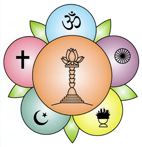
The special feature of Indian culture is that here the dress and demeanour, the language and literature, the manner and mode of living, the ideals and institutions are all attuned to the spiritual progress of man, emphasising as they do the superiority of the spirit over the body, the subtle over the gross. Everything is subordinated to that supreme task. The body should be fed and kept free from disease. Why? So that it may be fit for spiritual discipline. Spiritual discipline for what? For the realisation of the truth about oneself. The subtle is the basis for the gross; the Divine is the basis for the human. Indian culture turns your eye to the basis, not to what is built upon it. This outlook was, for long, the natural outlook for every Indian; it was indeed automatic. It was imbibed at the mother’s lap, from the father in the field, the teacher at school, from neighbour, friends and relatives, from the old and the young, and from whatever was done or written or spoken by those around. – Divine Discourse, Feb 20, 1964.
Gedanke für den Tag aus Prasanthi Nilayam vom 27. August 2022
Die Besonderheit der indischen Kultur besteht darin, dass hier die Kleidung und das Benehmen, die Sprache und die Literatur, die Art und Weise der Lebensführung, die Ideale und Institutionen auf den spirituellen Fortschritt des Menschen abgestimmt sind, indem sie die Überlegenheit des Geistes über den Körper, des Subtilen über das Grobe betonen. Alles ist dieser obersten Aufgabe untergeordnet. Der Körper soll genährt und von Krankheiten freigehalten werden. Warum das? Damit er für die geistige Disziplin fit ist. Spirituelle Disziplin für was? Für das Erkennen der Wahrheit über sich selbst. Das Feinstoffliche ist die Grundlage für das Grobstoffliche; das Göttliche ist die Grundlage für das Menschliche. Die indische Kultur richtet den Blick auf die Basis, nicht auf das, was darauf aufbaut. Diese Sichtweise war lange Zeit die natürliche Sichtweise eines jeden Inders; sie war tatsächlich automatisch. Sie wurde auf dem Schoß der Mutter, vom Vater auf dem Feld, vom Lehrer in der Schule, von Nachbarn, Freunden und Verwandten, von den Alten und den Jungen und von allem, was die Menschen in ihrer Umgebung taten, schrieben oder sprachen, aufgesogen.
Sri Sathya Sai, 20. Februar 1964
© Sri Sathya Sai Media Centre | Sri Sathya Sai Sadhana Trust – Publications Division
